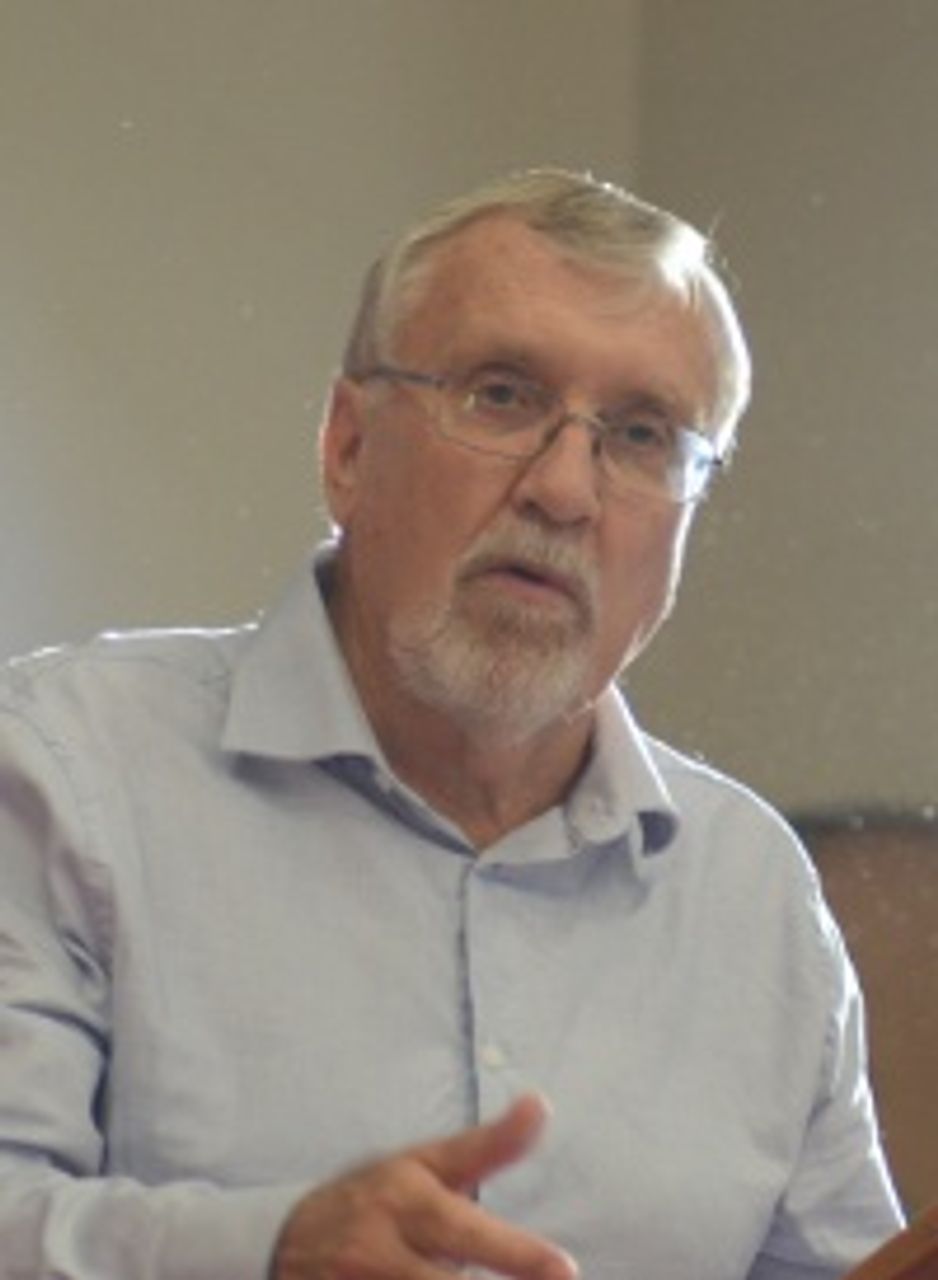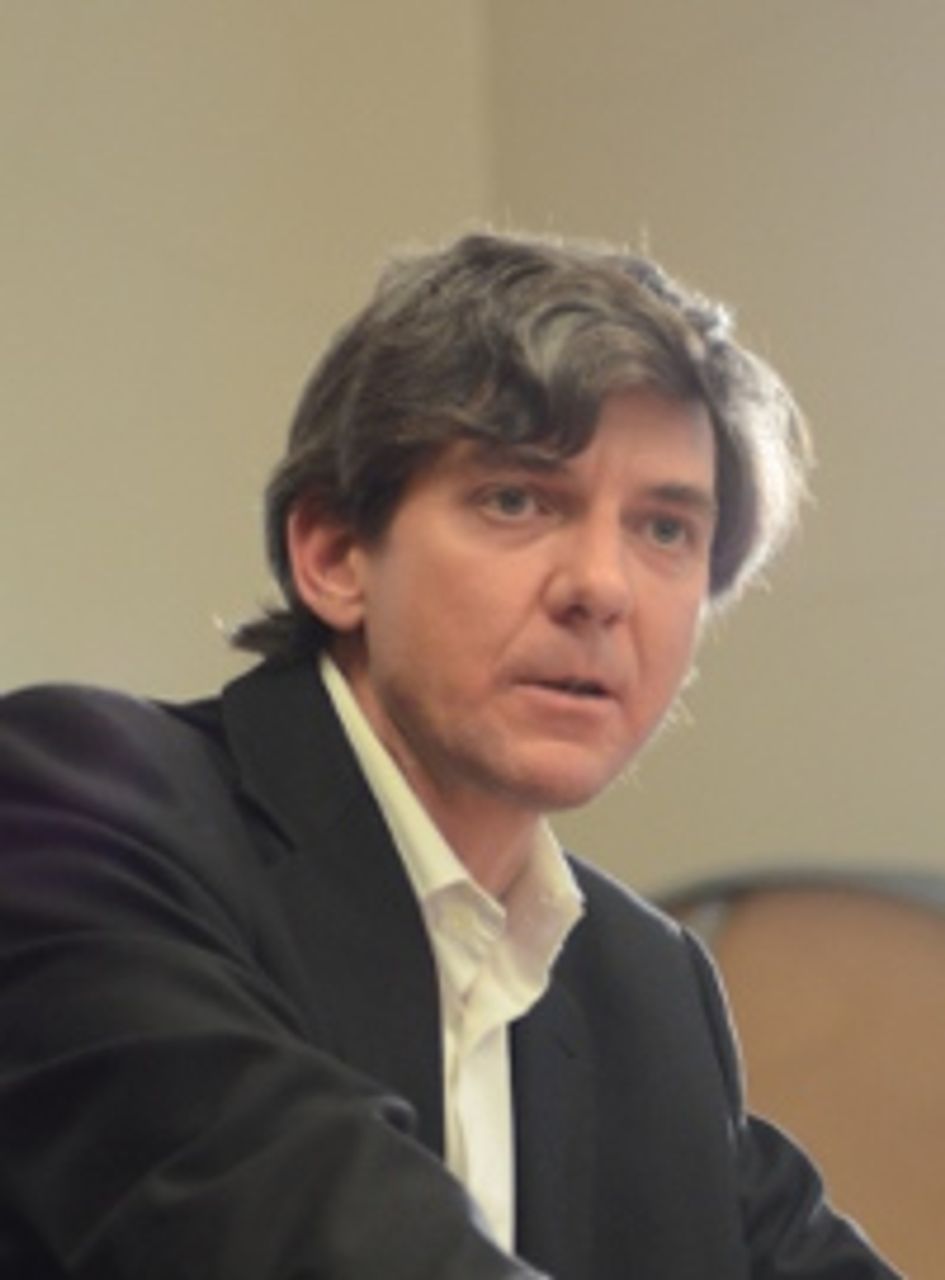The Socialist Equality Party held public meetings in Sydney and Melbourne last week on the political implications of the Gillard Labor government’s endorsement of Washington’s aggressive economic and military preparations against China.
Last month Canberra announced that northern and western Australia would become staging bases for the US military in the Asia-Pacific and Indian Ocean regions. This includes the stationing of US marines in the Northern Territory and the use of Darwin and Tindal air bases by the US Air Force. The Labor government also lifted long-standing bans on Australian uranium sales to nuclear-armed India.
Entitled “The US-Australia military agreements: Preparations for war with China,” the SEP meetings—the only public events held in Australia to discuss these vital issues—were addressed by SEP national organiser James Cogan and chaired by Nick Beams, SEP national secretary and a member of the WSWS international editorial board.
 Nick Beams
Nick BeamsBeams noted that it was almost 100 years since the eruption of World War I, an event that opened the way to more than three decades of war and revolution. He pointed out that contemporary developments bore a striking resemblance to the period that preceded the outbreak of hostilities on August 4, 1914.
The SEP national secretary detailed the economic and political driving forces that produced World War I—a global conflict over raw materials, markets and geo-political influence. The war, he said, with its trenches, mass killings and horrific new weapons, posed the historic necessity for the revolutionary socialist overthrow of the profit system.
Beams explained that the Russian Revolution of 1917—the first socialist revolution in history—was prevented from extending into Europe and internationally by the betrayals of the Labor and social democratic parties. This, in turn, saw the emergence of the Stalinist bureaucracy in the Soviet Union, which falsely claimed that socialism could be constructed within national boundaries. While the revolution was isolated and betrayed, the contradictions of capitalism deepened and gave rise to depression, fascism and the destruction wrought by World War II.
The speaker detailed how the post-war restabilisation, which rested on the economic and military strength of US imperialism and the Stalinist betrayals of the revolutionary struggles of the working class, had collapsed.
Beams reviewed today’s deepening global financial crisis and the rise of imperialist military aggression, noting: “All the conditions are being created for another war over the Pacific, and this time Indian, oceans. The last such war ended with the use of nuclear weapons. Discussion and planning for the next conflict factors in their possible use from the very outset.”
James Cogan delivered the main report to the meeting. He said the recent US-Australia military agreements reflected Obama administration attempts to secure greater American access and influence in Asia.
 James Cogan
James CoganCogan used PowerPoint slides to explain how American military domination of key shipping routes could be used to impose an oil or gas embargo on China. (See: Map of critical sea lanes) The Australian continent had been selected as a major US military base, he said, because of its proximity to the South-East Asian straits of Malacca, Sunda and Lombok, through which sea trade between the Indian and Pacific Oceans must pass. “What every worker and young person must understand is that the Labor government has placed the Australian working class on the front line of a potential nuclear war, without public debate and behind the backs of the population,” he said.
The SEP national organiser reviewed Washington’s increasingly aggressive moves to ‘persuade’ various Asia-Pacific states—from Japan, South Korea, Vietnam and the Philippines to Burma—into supporting its stance against China. Cogan also pointed to Washington’s involvement in the political coup that removed Kevin Rudd as prime minister in June 2010. Rudd was overthrown and Julia Gillard elevated by Labor and trade union powerbrokers who had secret relations with the US embassy in Canberra, he said.
Cogan noted that the “left” of official Australian politics—the Greens, the trade unions and the various petty-bourgeois protest organisations such as Socialist Alliance and Socialist Alternative—were playing a pernicious political role. While the Greens had made token criticisms of Australian involvement in US-led military occupations of Iraq and Afghanistan, he said, they had argued that Canberra should focus on reversing growing Chinese influence in East Timor and the South Pacific and defending Australia’s “own arc of stability.”
The Greens and the pseudo-left, Cogan said, had said nothing about US involvement in the ousting of a prime minister, its immense anti-democratic implications, or its direct relationship to aligning Australia with Washington’s war preparations against China.
Cogan rejected the claims of all those who argued that war against China was impossible because it would have devastating consequences for all sides. “War does not arise from the intentions of political leaders,” he said, “but is the outcome of the irresolvable contradictions between an integrated world economy and its division into competing capitalist nation-states.”
The speaker concluded by explaining that the only social force “capable of preventing the catastrophe of nuclear war is a unified revolutionary and socialist movement of the international working class” because it had no objective interest in maintaining private ownership of the means of production or the nation-state system.
“The struggle against militarism in Australia requires a conscious political movement against the Labor government and its props in the Greens, the trade unions and pseudo-left organisations. Its aim must be the establishment of a workers’ government based on a socialist and internationalist program that strives to link up and extend the socialist revolution throughout the Asia-Pacific region and the world. The SEP and its world party, the International Committee of the Fourth International, is the foundation and necessary leadership of such a movement.”
The reports provoked numerous questions by students, workers, professional people and retirees in attendance, including on the role of other major powers in the US-China tensions, the nature of the Chinese regime and the pre-World War II tensions between the US and Japan. Some of the participants spoke to WSWS reporters after the meetings.
* * *
Rob, a teacher currently visiting from Germany, said he found the meeting reports elucidating and shocking. “James Cogan’s presentation showed the importance of the sea lanes between the Indian Ocean and the South China Sea, which are so clearly central to the US strategy of surrounding China and being in a position to clamp down on its energy supplies when the time becomes ripe for the United States.
“There are many parallels with past history. Before World War I, Britain and Germany were said to be so closely economically integrated that no war would be possible between them. Now the same is being said about the US and China. In Europe too, we see moves toward militarism, such as Hillary Clinton’s threats to Russia and the tensions erupting over the European Union.”
Referring to the Australian Greens, Rob said: “There are parallels here with the role that the Greens, led by Joschka Fischer, played in the last Social Democrat Party government in Germany. Their anti-war veneer, which won masses of support from young people in Germany, showed its true colours in their backing for the wars in Yugoslavia and Afghanistan.”
Chris, a public servant, said: “The events since Julia Gillard became prime minister have confirmed that the anti-Rudd coup was orchestrated in Washington. It shows that the working class doesn’t have a democratic say in its own security. It’s all about corporate profit... History has demonstrated that under capitalism human life doesn’t count for much.”
Joni, political science student at Victoria University, said the media had failed to discuss the implications of Washington’s military preparations against China because “it is part of the ruling class” and wanted to prevent ordinary people discussing these issues. “The working class has to have a say about this. Your perspective is the only perspective that can challenge capitalism.”
John, an IT contractor, said: “The main point that was raised is how Australia is in the middle of the biggest potential conflict at the moment, one between the two greatest powers, the United States and China. What struck me was that rather than being insulated from the rest of the world, any shift in geopolitical forces has always had a profound effect on Australia. This is contrary to what you hear in the media. In fact, the Australian economy is at the mercy of these forces.”
Max, a fourth-year civil engineering student at RMIT University, said: “One of the standout points for me was the inevitability of the aggressive actions between the United States and China. Other parties claim that the threat of war doesn’t exist where economic links, for example, between the US and China, are so strong as to prohibit that. What we’ve seen is exactly the opposite. Rival capitalist nations are entwined to the point where conflict is inevitable, rather than impossible.
“I knew about the involvement of Bill Shorten and Mark Arbib [Labor Party powerbrokers] in the coup against Rudd. However, I had absolutely no idea that they were acting as informants to Washington. I underestimated grossly the influence that Washington had on Australian political life.”
